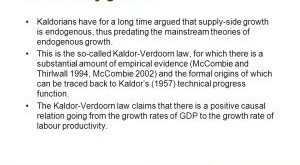Mainstream economics — a wildly inconsistent project In fact, most mainstream economists have never concerned themselves much with the workings of the economic systemm as a whole … The dominant concern, rather, has been, and remains, with highly specific or partial analyses of some highly restricted sectors or forms of behaviour … To the extent that it has ever been meaningful for the various disparate results or theorems of these economists to be considered as a whole, the clearest...
Read More »Scandalous and dangerous economics
Scandalous and dangerous economics It cannot be denied that there is something scandalous in the spectacle of so many people refining the analyses of economic states which they give no reason to suppose will ever, or have ever, come about. It probably is also dangerous. Equilibrium economics … is easily convertible into an apologia for existing economic arrangements and it is frequently so converted. Frank Hahn
Read More »Neoclassical immunization strategies
Taking into account the subtle nature of the underlying differentiation of assumptions, whose subtlety is exponentially increased by the structural lack of transparency with regard to the question how to assign one’s assumptions to explanatory and auxiliary hypotheses, it is unsurprising to see interpretations according to both extremes within the whole of economic literature. For neoclassical theory as an intellectual construct such a state implies an enormously advantageous situation....
Read More »Robert Solow on Chicago economics
Robert Solow on Chicago economics Suppose someone sits down where you are sitting right now and announces to me that he is Napoleon Bonaparte. The last thing I want to do with him is to get involved in a technical discussion of cavalry tactics at the battle of Austerlitz. If I do that, I’m getting tacitly drawn into the game that he is Napoleon. Now, Bob Lucas and Tom Sargent like nothing better than to get drawn into technical discussions, because then you have tacitly gone along with...
Read More »Zero Lower Bound (ZLB) Economics: The Fallacy of New Keynesian Explanations of Stagnation
This paper explores zero lower bound (ZLB) economics. The ZLB is widely invoked to explain stagnation and it fits with the long tradition that argues Keynesian economics is a special case based on nominal rigidities. The ZLB represents the newest rigidity. Contrary to ZLB economics, not only does a laissez-faire monetary economy lack a mechanism [...]
Read More »My new book now available in paperback
My new book now available in paperback This collection of previously published and new papers is a major intervention in the on-going debate about the nature and future of economics. Instead of the present deductivist-formalist orientation of mainstream economics, Lars Syll advocates for the adoption of a more pluralist approach to economics, arguing for more realism and relevance with less insistence on mathematical modeling. This challenging and thought-provoking book will prove a...
Read More »Bayes vs. Keynes on probability and belief in economic theory
Bayes vs. Keynes on probability and belief in economic theory An alternative possibility is to accept the consequences of the apparent fact that the central prediction of the Bayesian model in its descriptive capacity, that people’s choices are or are ‘as if’ they are informed by real-valued subjective probabilities, is, in general, false … According to Keynes’s decision theory it is rational to prefer to be guided by probabilities determined on the basis of greater evidential ‘weight’,...
Read More »The Urgent Need to Save Orthodox Economists from their Crippling Myths
William K. Black February 29, 2016 Brooklyn, N.Y. A blogger has trolled all heterodox economists as believers in the “occult.” More precisely, he is upset about “econ people” (who are likely not economists) and who tweet him or post comments on his blog site. The blogger further complains that these commenters say that they believe in heterodox economics and “new methodologies [that] are poised to topple mainstream economics.” He then goes on to say: “My typical response is to ask...
Read More »Friedman’s response to Romer & Romer
Friedman’s response to Romer & Romer As yours truly wrote the other day, reading the different reactions, critiques and ‘analyses’ of Gerald Friedman’s calculations on the long term effects of implementing the Sanders’ program, thre whole issue seems to basically burn down to if the Verdoorn law is operative or not. In Friedman’s response to Romer & Romer today this is made even clearer than in the original Friedman analysis: The Romers … would acknowledge that following a negative...
Read More »Transitivity — just another questionable assumption
Transitivity — just another questionable assumption My doctor once recommended I take niacin for the sake of my heart. Yours probably has too, unless you’re a teenager or a marathon runner or a member of some other metabolically privileged caste. Here’s the argument: Consumption of niacin is correlated with higher levels of HDL, or “good cholesterol,” and high HDL is correlated with lower risk of “cardiovascular events.” If you’re not a native speaker of medicalese, that means people with...
Read More » Heterodox
Heterodox








